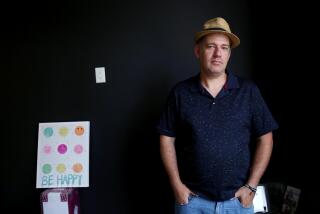Investor Kevin Bermeister has big plans for Jerusalem, West Bank
- Share via
JERUSALEM — Australian technology investor Kevin Bermeister has had some hits and misses in his career.
He founded the popular file-sharing network Kazaa, built Australia’s largest video game distributor and was an early investor in Skype.
Less successful ventures included the now-defunct Sega World theme park in Sydney and an offshoot of troubled PC-maker Packard Bell.
Now he has set his investment sights on Jerusalem. After buying a 185-room hotel and bidding on a troubled Jewish development in East Jerusalem that was about to be sold to a Palestinian billionaire, he has proposed his most ambitious — some say far-fetched — plan: Jerusalem 5800, a 30-year, $30-billion redevelopment blueprint to transform the ancient holy city into a sprawling international tourist hub.
The businessman, who is Jewish, envisions 50,000 new hotel rooms, a new international airport in the West Bank and an underground metro line running through the city’s archaeologically rich terrain.
Bermeister, 52, told the Los Angeles Times that his privately led vision will succeed where government redevelopment plans have failed.
Why so much interest in Jerusalem?
I’ve been coming here for seven or eight years, looking and scouting. We’ve identified a business opportunity. I think we can take advantage of it, provide a return to investors and get out before everyone else wants to get in.
No ideological or religious motivation?
I’ve become more religious in the last eight or nine years. My motivation and inspiration come from my growing knowledge of spiritual matters, but my business acumen and decision-making processes are completely distinct.
Planners have long dreamed about tapping into Jerusalem’s tourism potential, but residents are less enthusiastic. Arabs often view redevelopment as a ploy to displace them, and many ultra-Orthodox Jews object to making concessions for foreign tourists.
Thirty-eight percent of people in Jerusalem live in poverty. Our plan focuses on exploiting what we believe is an underexploited opportunity that returns to the constituents of the city opportunities for gainful employment. Ultimately it’s the poverty in the city that invites the ideology and creates the rift. Our goal is to improve the life for the people of the city, regardless of who they are.
The plans appear to be created in a political vacuum, where there is no Green Line border, no Palestinian state, no religious sensitivity. Yet those things exist.
Can you show me on any street in Jerusalem where the Green Line is? I’ve never seen it.
It’s on maps and in people’s minds and memories.
It may be. But we don’t really care to engage in the various vested agendas that exist in people’s minds. We are focusing on looking at the optimal use of the city. No divided city has ever performed as well as a united one. We don’t look at the political landscape.
Can you just ignore political and religious realities?
Reality is dynamic. It changes.
One of your most controversial proposals is an international airport south of Jericho on land Palestinians claim for their state. The plan also envisions expanding the Jerusalem metropolitan area deep into the West Bank. Did you seek approval from the Palestinian Authority?
We don’t have approval from Israeli authorities. We don’t have approval from anyone.
Shouldn’t you at least consult with Palestinian officials?
Actually the airport plan originates from a Palestinian Authority proposal, and we built upon that.
But under the Palestinian plan, they would control the airport, not Israel.
We don’t know who will control the airport. Whoever steps up with $3.5 billion to fund it will ultimately make the decision.
There’s no Palestinian state in any of your maps, only Arab areas. Do you believe in a two-state solution?
No I don’t. I don’t think a two-state solution will serve the constituents —Muslim, Jewish and Christian — nearly as much as a single-managed body with an elected parliament where people have equal rights.
You speak about peace through economic prosperity, but Palestinians sacrificed their economic progress in 2000 with the uprising. Many would say they won’t give up on the dream of statehood for the promise of jobs in hotels and an airport.
I’m not asking them to do that. If they are prepared to elect a body to represent them and form a state, that’s their right.
But what happens if all these new hotels, businesses and the airport suddenly find themselves located in a new Palestinian state? Isn’t that a risk for investors? What if the Palestinian government seized those things?
One would imagine in this world that an elected body wouldn’t seize anything. Business acumen and responsibility to constituents would prevail. And you can find a lot of Jewish businessmen in Israel today who are making great investments with Palestinian counterparts in the West Bank.
How much of your own personal fortune are you investing in Jerusalem 5800?
Right now I’m in the Leonardo [Inn] Hotel [Jerusalem] property that we just acquired and the Nof Zion [complex in East Jerusalem], which we are negotiating to acquire. By the time we have finished, we will have invested $50 million or more. I’m an opportunist. I act when I see investments that will bring good returns. But I don’t have a set limit at this point.
More to Read
Sign up for Essential California
The most important California stories and recommendations in your inbox every morning.
You may occasionally receive promotional content from the Los Angeles Times.













